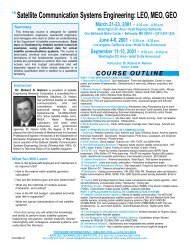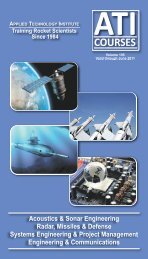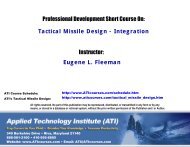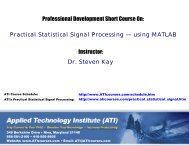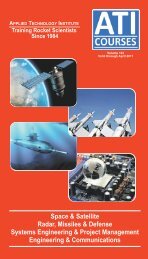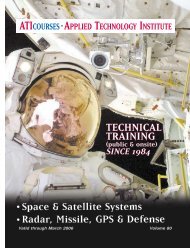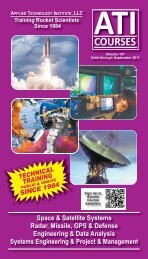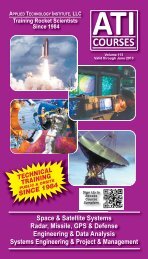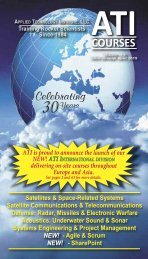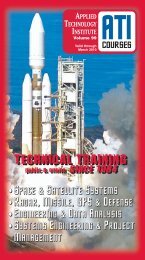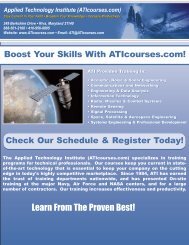Acoustics & Sonar Engineering Radar, Missiles & Defense Systems ...
Acoustics & Sonar Engineering Radar, Missiles & Defense Systems ...
Acoustics & Sonar Engineering Radar, Missiles & Defense Systems ...
Create successful ePaper yourself
Turn your PDF publications into a flip-book with our unique Google optimized e-Paper software.
Fundamentals of <strong>Systems</strong> <strong>Engineering</strong><br />
December 5-6, 2011<br />
Orlando, Florida<br />
February 14-15, 2012<br />
Columbia, Maryland<br />
$990 (8:30am - 4:00pm)<br />
"Register 3 or More & Receive $100 00 each<br />
Off The Course Tuition."<br />
Summary<br />
Today's complex systems present difficult<br />
challenges to develop. From military systems to aircraft<br />
to environmental and electronic control systems,<br />
development teams must face the challenges with an<br />
arsenal of proven methods. Individual systems are<br />
more complex, and systems operate in much closer<br />
relationship, requiring a system-of-systems approach<br />
to the overall design.<br />
This two-day workshop presents the fundamentals<br />
of a systems engineering approach to solving complex<br />
problems. It covers the underlying attitudes as well as<br />
the process definitions that make up systems<br />
engineering. The model presented is a researchproven<br />
combination of the best existing standards.<br />
Participants in this workshop practice the processes<br />
on a realistic system development.<br />
Instructors<br />
Eric Honour, CSEP, has been in international<br />
leadership of the engineering of<br />
systems for over a decade, part of a 40year<br />
career of complex systems<br />
development and operation. His<br />
energetic and informative presentation<br />
style actively involves class<br />
participants. He is a former President of<br />
the International Council on <strong>Systems</strong><br />
<strong>Engineering</strong> (INCOSE). He has been a systems<br />
engineer, engineering manager, and program manager<br />
at Harris, E<strong>Systems</strong>, and Link, and was a Navy pilot.<br />
He has contributed to the development of 17 major<br />
systems, including Air Combat Maneuvering<br />
Instrumentation, Battle Group Passive Horizon<br />
Extension System, and National Crime Information<br />
Center. BSSE (<strong>Systems</strong> <strong>Engineering</strong>) from US Naval<br />
Academy and MSEE from Naval Postgraduate School.<br />
Dr. Scott Workinger has led innovative technology<br />
development efforts in complex, riskladen<br />
environments for 30 years. He<br />
currently teaches courses on program<br />
management and engineering and<br />
consults on strategic management and<br />
technology issues. Scott has a B.S in<br />
<strong>Engineering</strong> Physics from Lehigh<br />
University, an M.S. in <strong>Systems</strong> <strong>Engineering</strong> from the<br />
University of Arizona, and a Ph.D. in Civil and<br />
Environment <strong>Engineering</strong> from Stanford University.<br />
Course Outline<br />
1. <strong>Systems</strong> <strong>Engineering</strong> Model. An underlying process<br />
model that ties together all the concepts and methods.<br />
System thinking attitudes. Overview of the systems<br />
engineering processes. Incremental, concurrent processes<br />
and process loops for iteration. Technical and management<br />
aspects.<br />
2. Where Do Requirements Come From?<br />
Requirements as the primary method of measurement and<br />
control for systems development. Three steps to translate an<br />
undefined need into requirements; determining the system<br />
purpose/mission from an operational view; how to measure<br />
system quality, analyzing missions and environments;<br />
requirements types; defining functions and requirements.<br />
3. Where Does a Solution Come From? Designing a<br />
system using the best methods known today. What is an<br />
architecture? System architecting processes; defining<br />
alternative concepts; alternate sources for solutions; how to<br />
allocate requirements to the system components; how to<br />
develop, analyze, and test alternatives; how to trade off<br />
results and make decisions. Establishing an allocated<br />
baseline, and getting from the system design to the system.<br />
<strong>Systems</strong> engineering during ongoing operation.<br />
4. Ensuring System Quality. Building in quality during<br />
the development, and then checking it frequently. The<br />
relationship between systems engineering and systems<br />
testing. Technical analysis as a system tool. Verification at<br />
multiple levels: architecture, design, product. Validation at<br />
multiple levels; requirements, operations design, product.<br />
5. <strong>Systems</strong> <strong>Engineering</strong> Management. How to<br />
successfully manage the technical aspects of the system<br />
development; planning the technical processes; assessing<br />
and controlling the technical processes, with corrective<br />
actions; use of risk management, configuration management,<br />
interface management to guide the technical development.<br />
6. <strong>Systems</strong> <strong>Engineering</strong> Concepts of Leadership. How<br />
to guide and motivate technical teams; technical teamwork<br />
and leadership; virtual, collaborative teams; design reviews;<br />
technical performance measurement.<br />
7. Summary. Review of the important points of the<br />
workshop. Interactive discussion of participant experiences<br />
that add to the material.<br />
Who Should Attend<br />
You Should Attend This Workshop If You Are:<br />
• Working in any sort of system development<br />
• Project leader or key member in a product development<br />
team<br />
• Looking for practical methods to use today<br />
This Course Is Aimed At:<br />
• Project leaders,<br />
• Technical team leaders,<br />
• Design engineers, and<br />
• Others participating in system development<br />
Register online at www.ATIcourses.com or call ATI at 888.501.2100 or 410.956.8805 Vol. 109 – 25



